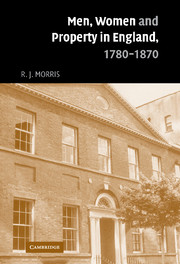 Men, Women and Property in England, 1780–1870
Men, Women and Property in England, 1780–1870 Book contents
- Frontmatter
- Contents
- List of figures
- List of tables
- Acknowledgements
- 1 Joseph Henry Oates: a world of madeira and honey
- 2 In search of the British middle class
- 3 Reading the wills: a window on family and property
- 4 The property cycle
- 5 Strategies and the urban landscape
- 6 Women and things and trusts
- 7 Life after death
- 8 Networks and place
- 9 The economic history of the British middle class, 1816–70
- 10 Conclusion and Epilogue
- Bibliography
- Index
10 - Conclusion and Epilogue
Published online by Cambridge University Press: 28 July 2009
- Frontmatter
- Contents
- List of figures
- List of tables
- Acknowledgements
- 1 Joseph Henry Oates: a world of madeira and honey
- 2 In search of the British middle class
- 3 Reading the wills: a window on family and property
- 4 The property cycle
- 5 Strategies and the urban landscape
- 6 Women and things and trusts
- 7 Life after death
- 8 Networks and place
- 9 The economic history of the British middle class, 1816–70
- 10 Conclusion and Epilogue
- Bibliography
- Index
Summary
The relationships of men, women and property and the strategies of families and individuals have been explored through the fragmented, partial and distorting lenses of account books, letters, property deeds and, above all, the text of wills.
The first outcome was the identification of a cast of characters which went well beyond that of the law books, advice manuals, poetry and sermons which created the ideal of domesticity, relentlessly directing attention to man, wife and children. Many case studies did place the married man concerned for wife and children at the centre of decision taking, but he was accompanied by unmarried brothers and unmarried sisters. Beyond them were uncles and aunts, siblings, nephews and nieces, whose roles changed according to their status as married or unmarried, childless or having children still alive. Beyond them were the shadowy figures of the dead – dead children who were left orphaned or single-parent grandchildren, dead husbands who left widows and minor children.
The text of a will was a highly specialised way of looking at an individual's relationships and strategies, but it was one of the few occasions on which a large number of individuals could be interrogated in a reasonably consistent way. Only 40 per cent of the will-makers in the Leeds sample found themselves in the situation of the male head of household with wife and children, the responsible decision-taker. Diversity of situation and potential decision-taking strategies were key features of the property holding classes.
- Type
- Chapter
- Information
- Men, Women and Property in England, 1780–1870A Social and Economic History of Family Strategies amongst the Leeds Middle Class, pp. 367 - 416Publisher: Cambridge University PressPrint publication year: 2005


